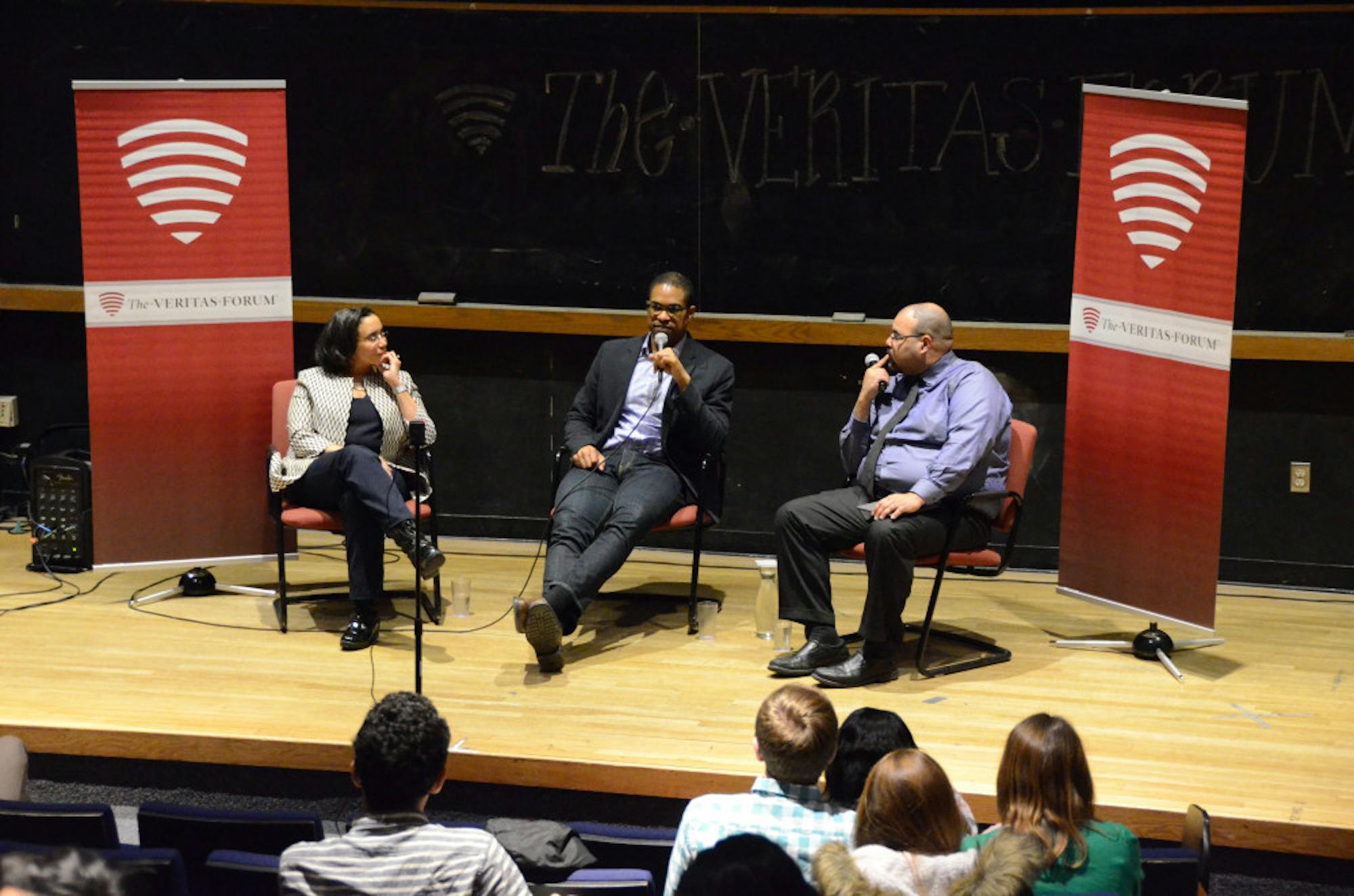The Veritas Forum, an organization that plans discussions based on the Christian faith, hosted a panel discussion about race and religious identity in Barnum Hall last night, in front of an audience of more than 25 people.
The event, which was cosponsored by the Tufts Christian Fellowship, featured Massachusetts Institute of Technology Associate Professor of Mechanical Engineering Cullen Buie and Harvard University Professor of Education Nancy Hill as speakers, with Tufts Lecturer of Music David Coleman moderating the talk.
After a brief prelude by a student leader, Coleman introduced the two speakers. Coleman argued that faith is important to discuss because religious figures have played both positive and negative roles in American history.
"In the history of our country, Christians have played both a role as the oppressors as well as a role as liberators," Coleman said.
Buie said that when he was growing up he was not particularly religious, but he became more religious as an undergraduate student. Hill, on the other hand, went to a predominantly African-American church but lived in a largely white neighborhood, so religion was intertwined with race and ethnicity, she said. She added that, as a psychologist, she wanted to understand why she believes in God.
"I had to separate my relationship with God from my ethnic identity," Hill said. "As I began to attend churches that were disconnected from my ethnicity ... I began to see some of the commonalities of faith."
Coleman asked Hill about the roots of racial bias, and whether human beings are predisposed to prejudice. Hill said that people are not prejudiced from birth because, when humans are born, they are able to discern and interpret different languages and cultures. Nonetheless, Hill said that when people are raised homogeneously, they lose their ability to appreciate diversity
"The solution to that ... is that the earlier we integrate schools, even preschool, even daycare, the less predisposed people will be to racial bias," Hill said.
However, Hill argued that colorblindness is not necessarily a desired outcome because that would lead to homogeneity of one culture. Instead, she said, it is best for people to experience and appreciate the diversity of different human cultures.
Buie warned that people have a tendency not to acknowledge their own prejudices and biases, which makes it more difficult to confront the problem of racism. He suggested that the Christian faith can potentially offer a solution because it encourages humility.
Hill said that the disparities in the educational system and inequities in educational opportunities are evidence that there is still a problem of systemic racism in the United States. She noted that elementary schools in wealthy Greater Boston suburbs clearly have more resources than schools in more socioeconomically disadvantaged neighborhoods.
Buie said that he recognized the problem of racial under-representation when he was in graduate school at Stanford University, where there were few other African-American students. He observed that study groups in many of his classes tended to be divided by race. He said he is not sure whether those experiences were evidence of systemic racism, but he said that those problems aggravate the problem of inequity.
"If you design a system where it often requires a group in order to be successful, if you are part of a group where you are isolated, you inevitably have to be more resourceful, more social [and] work a little bit harder," Buie said.
After hearing Buie's and Hill's stories, Coleman said that he has also felt subtle racial prejudice as an African-American man, because people's treatment of him often changes after meeting him in person.
Coleman then asked both panelists whether Christianity breeds racism or is a potential solution to racism. In particular, he noted that slaveowners in the American South used Christianity to defend their behavior, but abolitionists also cited the Christian faith.
Hill acknowledged that the problem of Christianity and racism is challenging, and she said it is unsurprising that some people will exploit faith to uphold their own message. Nonetheless, she argued that Christianity's focus on reconciliation and non-judgement is ultimately positive.
Buie said that racism is not a result of Christianity, but instead is a corruption of the religion. He argued that the Bible takes a stance in support of downtrodden people, which is why it is wrong for Christians in the United States to reject immigrants or refugees.
"Before you judge Christianity, read the book," Buie said.
Later, the panelists talked about how best to facilitate a conversation about race. Buie said that humility is the most important aspect of that conversation, because people should recognize that they might not understand the full range of human experiences. Hill added that people should try to be aware of their own implicit biases because almost everybody is slightly prejudiced.
At the end of the forum, the panelists took several questions from the audience. In response to one student's question, Hill reiterated that she believes there are many different types of oppressed people, which is why every type of social injustice must be confronted.
"As we think about reconciliation and racial justice, we shouldn't all only fight for our own causes," Hill said. "[Other people's] justice is tied to my justice."
Veritas Forum group hosts panel discussion on faith, race relations






